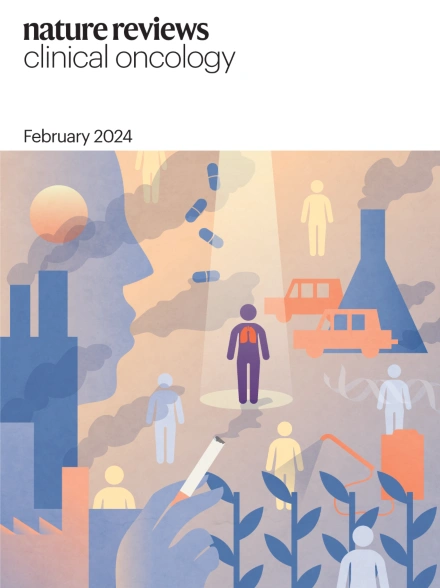胰腺癌的肿瘤微环境-新的临床挑战,但更多的机会。
IF 82.2
1区 医学
Q1 ONCOLOGY
引用次数: 0
摘要
晚期胰腺导管腺癌(PDAC)患者主要接受化疗,尽管一些患者最初有反应,但大多数患者会出现疾病进展,结果往往令人沮丧。这种临床有效性的缺乏不仅部分反映了癌细胞的内在因素,而且还反映了肿瘤微环境(TME)的存在,该环境阻碍了系统性治疗和循环免疫细胞进入原发肿瘤,并支持PDAC细胞的生长。结合改进的PDAC临床前模型,单细胞空间多组学和基于机器学习的模型的进展为解开TME的复杂性提供了新的方法。在这篇综述中,我们将重点关注PDAC的结缔组织增生基质以及肿瘤内和肿瘤间的异质性,重点关注癌症相关成纤维细胞及其周围的免疫细胞龛。我们描述了通过启动T细胞激活、克服T细胞衰竭和解开骨髓细胞介导的免疫抑制,将免疫“冷”PDAC TME转化为“热”TME的新方法。此外,我们还探索了涉及TME的综合靶点,如肿瘤、基质和免疫细胞代谢之间的交汇点以及致癌KRAS信号传导。最后,基于我们过去失败的临床试验经验,我们考虑了这种不断发展的对TME的全面理解将如何确保未来成功地为PDAC患者开发更有效的治疗方法。本文章由计算机程序翻译,如有差异,请以英文原文为准。
The tumour microenvironment in pancreatic cancer - new clinical challenges, but more opportunities.
Patients with advanced-stage pancreatic ductal adenocarcinoma (PDAC) predominantly receive chemotherapy, and despite initial responses in some patients, most will have disease progression and often dismal outcomes. This lack of clinical effectiveness partly reflects not only cancer cell-intrinsic factors but also the presence of a tumour microenvironment (TME) that precludes access of both systemic therapies and circulating immune cells to the primary tumour, as well as supporting the growth of PDAC cells. Combined with improved preclinical models of PDAC, advances in single-cell spatial multi-omics and machine learning-based models have provided novel methods of untangling the complexities of the TME. In this Review, we focus on the desmoplastic stroma and both the intratumoural and intertumoural heterogeneity of PDAC, with an emphasis on cancer-associated fibroblasts and their surrounding immune cell niches. We describe new approaches in converting the immunologically 'cold' PDAC TME into a 'hot' TME by priming T cell activation, overcoming T cell exhaustion and unravelling myeloid cell-mediated immunosuppression. Furthermore, we explore integrated targets involving the TME, such as points of convergence among tumour, stromal and immune cell metabolism as well as oncogenic KRAS signalling. Finally, building on our experience with failed clinical trials in the past, we consider how this evolving comprehensive understanding of the TME will ensure future success in developing more effective therapies for patients with PDAC.
求助全文
通过发布文献求助,成功后即可免费获取论文全文。
去求助
来源期刊
CiteScore
99.40
自引率
0.40%
发文量
114
审稿时长
6-12 weeks
期刊介绍:
Nature Reviews publishes clinical content authored by internationally renowned clinical academics and researchers, catering to readers in the medical sciences at postgraduate levels and beyond. Although targeted at practicing doctors, researchers, and academics within specific specialties, the aim is to ensure accessibility for readers across various medical disciplines. The journal features in-depth Reviews offering authoritative and current information, contextualizing topics within the history and development of a field. Perspectives, News & Views articles, and the Research Highlights section provide topical discussions, opinions, and filtered primary research from diverse medical journals.

 求助内容:
求助内容: 应助结果提醒方式:
应助结果提醒方式:


